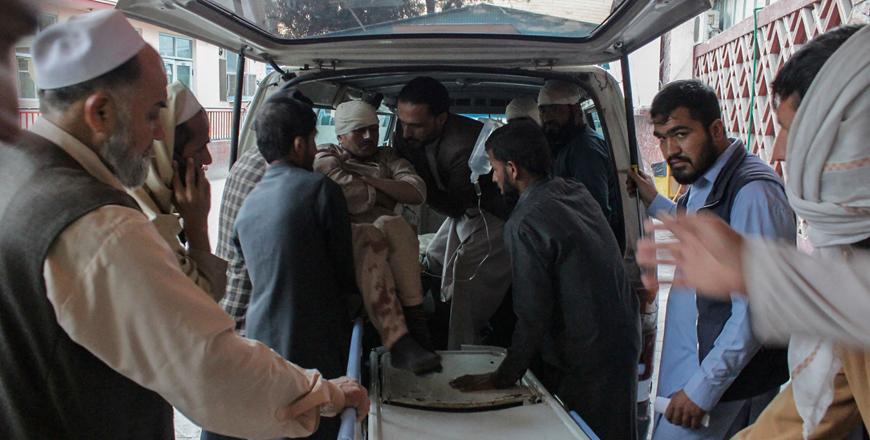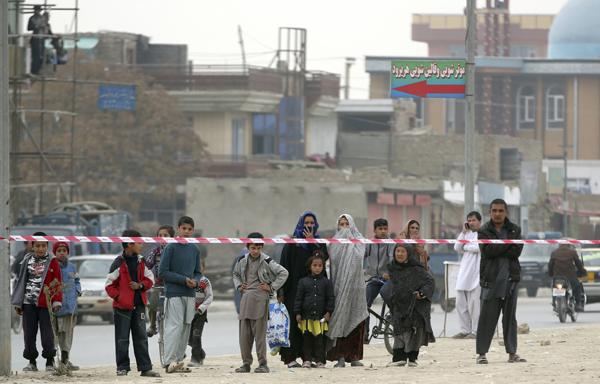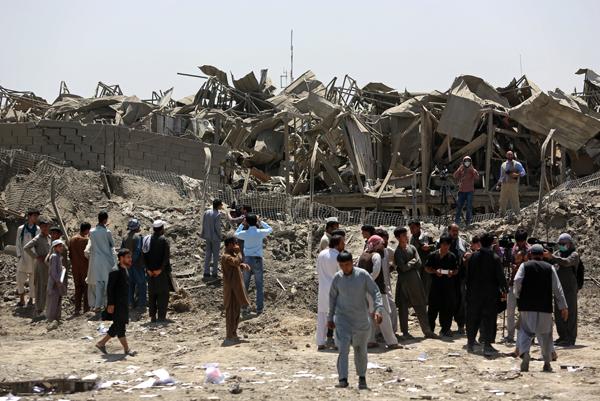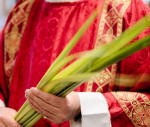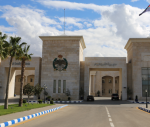You are here
80 dead as Daesh claims twin blasts during Kabul protest
By AFP - Jul 23,2016 - Last updated at Jul 23,2016
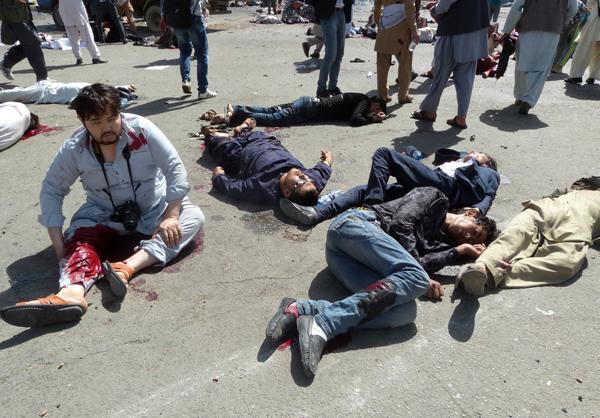
Wounded man sits next to other victims of a blast during a demonstration in Kabul, Afghanistan, on Saturday (Reuters photo)
KABUL — The Daesh terror group militants claimed responsibility for twin explosions Saturday that ripped through crowds of Shiite Hazaras in Kabul, killing at least 80 people and wounding 231 others in the deadliest attack in the Afghan capital since 2001.
The bombings during a huge protest over a power line mark the first major Daesh assault on the Afghan capital, apparently aimed at sowing sectarian discord in a country well known for Shia-Sunni harmony.
Charred bodies and dismembered limbs littered the scene of the attack, with ambulances struggling to reach the site as authorities had overnight blocked key intersections with stacked shipping containers to control movement of the protesters.
"As a result of the attack 80 people were martyred and 231 others were wounded," the interior ministry said.
"Based on initial information, the attack was carried out by three suicide bombers... The third attacker was gunned down by security forces."
The wounded overwhelmed city hospitals, officials said, with reports emerging of blood shortages and urgent appeals for donors circulating on social media.
The Taliban, who are in the middle of their annual summer offensive and are more powerful than Daesh, strongly denied any involvement in the attack.
Daesh claimed the bombings in a statement carried by its affiliated Amaq news agency, calling it an attack on Shiites.
"Two fighters of the Islamic State [Daesh] detonated their explosive belts in a gathering of Shiites in... Kabul," Amaq said.
The attack represents a major escalation for Daesh, which so has largely been confined to the eastern province of Nangarhar.
"It's long been a fear about Afghanistan that Daesh-aligned forces will try to inject a sectarian dimension into a largely non-sectarian conflict," Michael Kugelman, an analyst at the Woodrow Wilson Centre in Washington, told AFP.
The National Directorate of Security, Afghanistan's main intelligence agency, said the attack was masterminded by Abu Ali, a Daesh commander in Nangarhar's volatile Achin district.
Horrific attack
The bombings mark the deadliest single attack in the Afghan capital since the Taliban were toppled from power in a 2001 US-led invasion, the interior ministry said.
President Ashraf Ghani vowed "revenge" against the perpetrators of the attack and announced Sunday as a national day of mourning.
The assault came as thousands of demonstrators gathered to demand that a multi-million-dollar power line pass through their electricity-starved province of Bamiyan, one of the most deprived areas of Afghanistan with a large Hazara population.
"The horrific attack on a group of peaceful protesters in Kabul demonstrates the utter disregard that armed groups have for human life," Amnesty International said in a statement.
"Such attacks are a reminder that the conflict in Afghanistan is not winding down, as some believe, but escalating, with consequences for the human rights situation in the country that should alarm us all."
The protest march was largely peaceful before the explosions struck as the demonstrators sought to march on the presidential palace, waving flags and chanting slogans such as "death to discrimination".
The 500-kilovolt TUTAP power line, which would connect the Central Asian nations of Turkmenistan, Uzbekistan and Tajikistan with electricity-hungry Afghanistan and Pakistan, was originally set to pass through the central province.
But the government re-routed it through the mountainous Salang pass north of Kabul, saying the shorter route would speed up the project and save millions of dollars.
Hazara leaders in the ethnically divided nation lashed out at the Pashtun president, calling the decision prejudiced against the Hazaras, a community that has suffered a long history of oppression.
The 3 million-strong Hazara community has been persecuted for decades, with thousands killed in the late 1990s by Al Qaeda and the mainly Pashtun Sunni Taliban.
Related Articles
KABUL — A well-known Afghan journalist was killed and at least four other people injured on Saturday when a suspected bomb destroyed a minib
KABUL — The Daesh terror group claimed responsibility for a suicide attack on a crowded mosque in Kabul on Monday that killed more than 30 p
KABUL — A Taliban truck bomb exploded outside a protected hotel compound used by foreign service contractors in Kabul on Monday, ripping a d


